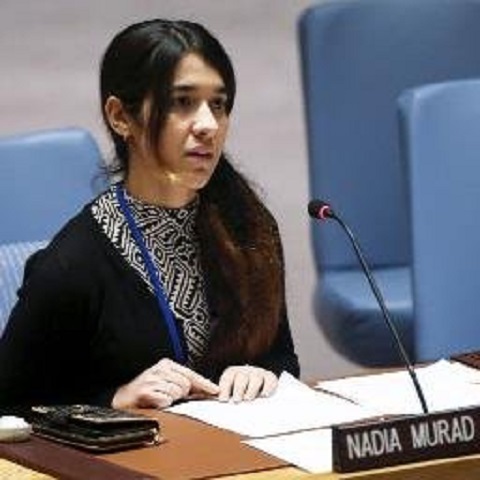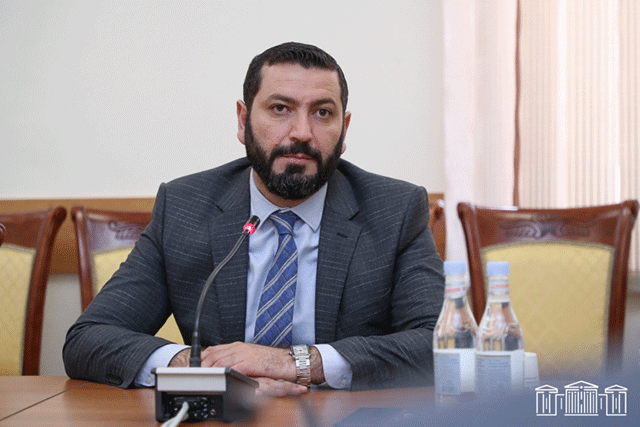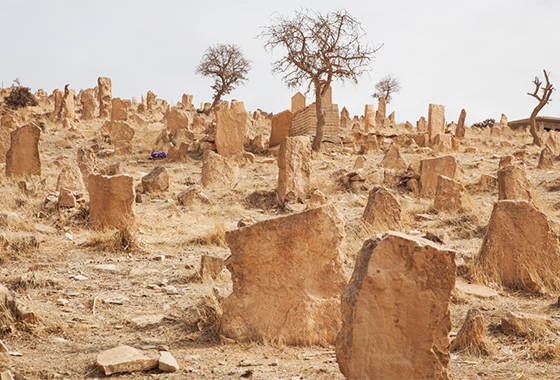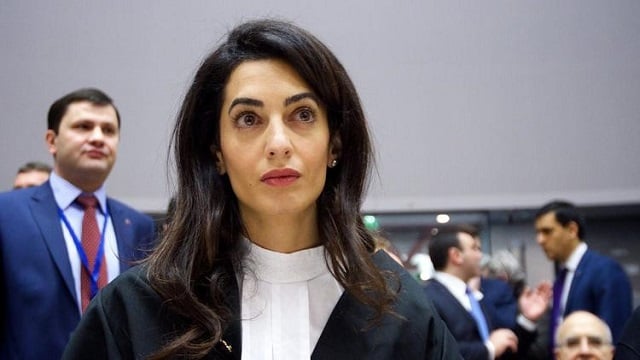The Armenian Mirror-Spectator. ERBIL, Kurdistan Region (Combined Sources) — Iraq’s Yazidi community remains overlooked by the international community and Erbil and Baghdad authorities six years on from the genocide, Yazidi survivor and Nobel Peace Prize laureate Nadia Murad said in a conference with UN officials on Monday, August 3.
“We have repeatedly pleaded to the governments in Erbil and Baghdad, as well as the international community to rebuild our hometown [Shingal],” Murad said. “But after so many years we feel that the international community and governments in Erbil and Baghdad abandoned us.”
In the summer of 2014, Islamic State (ISIS) extremists swept across swathes of Syria and Iraq. In August that year, they attacked the Yazidi homeland of Shingal in Nineveh province, committing genocide against the ethno-religious minority. Hundreds of thousands of Yazidis fled from the militants, but not everyone escaped. More than 1,000 were killed and 6,417 were captured by the militants, with women and children sold into sexual slavery.
Murad criticized the international community for ignoring the Yazidis, reminding them that international community is helping ISIS to reach its “goal” in failing to help survivors.
Read also
“We know Iraq is facing economic challenges,” Murad said. “But there are tangible and sustainable actions that can be taken into consideration to help Yazidis.”
“I ask the governments in Erbil and Baghdad to solve the security issues in Sinjar [Shingal], and keep helping the missing Yazidis,” Murad added. “Yazidis deserve support to rebuild, as they cannot wait for another six years to recover.”
As of this month, 3,530 Yazidis have been rescued or escaped ISIS, and 2,887 are still missing, according to the Kurdistan Regional Government’s office documenting the genocide.
Six years later, the vast majority of Yazidis continue to live in a protracted state of displacement. An array of armed forces, including the Iraqi army, Popular Mobilization Forces (PMF, or Hashd al-Shaabi) and PKK-affiliated groups have vied for control of Shingal, and many deem it too unsafe to return home.
“ISIS was responsible for this devastation but the rest of us are responsible for what we did or did not do since we knew about it” human rights lawyer Amal Clooney added on Monday.
Clooney also explained that “no progress” has been made in seeking international justice for the crimes committed against the community, with no state offering to host international trials.
“Survivors tell me that they cannot understand how six years after the genocide, the vast majority of ISIS fighters can simply go on with their lives,” Clooney added.
“Doing nothing is not only wrong, it dangerous because these fighters are not going anywhere and their toxic ideology continues to spread,” she added.
Although Baghdad announced the territorial defeat of ISIS in Iraq in December 2017, remnants of the group have returned to their earlier insurgency tactics, ambushing security forces, kidnapping and executing suspected informants, and extorting money from vulnerable rural populations, particularly in the disputed territories.
Hearings on Yazidi Case
Advocacy organization Yazda kicked off a two-day conference on August 2 to commemorate the anniversary by hearing from a range of senior officials, humanitarian workers, researchers, and survivors of the attack by ISIS militants.
With security tenuous and swathes of the district’s infrastructure and housing still in ruins and riddled with unexploded ordnance, many Yazidis are reluctant to return despite encouragement from Baghdad, Erbil, UN agencies, and local groups.
While most of the keynote presenters spoke in platitudes, other panelists pointed to the harder edge of the situation, expressing frustration about the lack of progress after so many years and sustained international attention.
The theme of the commemoration, which was jointly organized by Yazda and the Zovighian Partnership, was “Bridging the Gap Between Terror and Humanity.”
“Daesh perpetrated the most horrendous crimes against the Yazidi people to deprive them of their religious rituals and they will be brought to justice,” Iraqi President Barham Salih said in his opening remarks, using the Arabic acronym for ISIS.
“I call on all political forces to overcome their differences,” he added, referring to the political disputes between the federal government, the Kurdistan Regional Government (KRG), and the Nineveh provincial government, which several speakers blamed for the lack of progress.
Falah Mustafa, a senior foreign policy advisor to the President of the Kurdistan Region, called for increased international support for Yazidis in Sinjar and for the KRG, which hosts just under 1 million refugees and IDPs, while US Ambassador to Iraq Matthew Tueller announced the allocation of an additional $500,000 in reconstruction funding.
Other speakers focused on the experience and continued suffering of the survivors of the genocide.
“As an Yazidi girl, I experienced this genocide in all of its details,” said Yazidi Survivor Network member Farida Abbas Khalaf, before outlining a number of specific steps that should be taken by governments and humanitarian organizations, including prosecuting the perpetrators of the genocide, passing the draft women survivors’ law, increasing funding for psychiatric treatment and infrastructure reconstruction, and ending political disputes to ensure a stable security environment.
Karim Ahmad Khan, who is the Special Adviser and Head of the UN Investigative Team for the Promotion of Accountability for Crimes Committed by Daesh in Iraq (UNITAD), said that no counties “can be spectators” in seeking accountability for those who perpetrated the genocide and that minority communities in Iraq “must have a right to protection and to justice.”
The bluntest remarks of the day were made by Saib Khidir, a Yazidi member of the Council of Representatives, who called out all sides for shirking their obligations.
“Every stakeholder is throwing responsibility onto another stakeholder. Erbil says the problem is with Baghdad. Baghdad says the problem is with Erbil,” he said.
“This is not serving the Yazidi community. This is not showing love to the Yazidi community. If I love the Yazidi community, I should provide them with services,” he added.
Principal Deputy Assistant Secretary of State for Near Eastern Affairs Joey Hood said that he was shocked to see Popular Mobilization Forces (PMF) flags in Sinjar during a visit last year and was similarly saddened to hear about Turkish warplanes targeting alleged Kurdistan Workers’ Party (PKK) units in the district.
He called for locally-recruited police to be in charge of security, “not armed groups from some other location.”
In that vein, Director of the Assyrian Policy Institute Reine Hanna called for a local force to be created along the model of the Nineveh Plain Protection Units (NPU) and criticized the Kurdistan Democratic Party (KDP) for meddling in the district’s affairs.
Nevertheless, Khidir warned that even well-meaning solutions from outside could in fact undermine the very Yazidi governance that most of the panelists argued is necessary for establishing stability in Sinjar.
Armenian Leaders Offer Condolences
Prime Minister of Armenia Nikol Pashinyan addressed the Yazidi community of Armenia on the occasion of the Sinjar Genocide anniversary on Sunday.
He issued the following message:
‘’Dear sisters and brothers of the Yazidi community of Armenia, today we commemorate the anniversary of the genocide against the Yazidi people in Sinjar perpetrated by some terroristic organizations. Indeed, the tragedy that happened with the Yazidi people is a heinous crime against humanity and the civilized world. We share your grief and sincerely express solidarity with you.
“I wish the Yazidi community of Armenia, all the Yazidi families steadfastness and spiritual strength. As a consolation, always realize that in the homeland, in the Republic of Armenia, you have a safe and protected future and a wide field of progress.”
Speaker of Parliament of Armenia Ararat Mirzoyan also issued a statement on the anniversary of the Sinjar massacre.
“As a nation that survived genocide, we cannot stay indifferent upon witnessing the same crime being committed against any other people,” he said.
“Today we join the Yazidi community of Armenia to commemorate the memory of their brothers and sisters who died in Sinjar six years ago, Speaker of the Armenian National Assembly Ararat Mirzoyan said in a Facebook post.
In January 2018, the Armenian Parliament unanimously passed a resolution recognizing the Yazidi Genocide.
The National Assembly also called on the international community to track down and prosecute those directly responsible for the killings and “take measures to ensure the security of the Yazidi population.”
(Stories from Rudaw, NRT and Armenpress were used to compiled this report.)
Main caption: Nadia Murad testifying about the horrors she endured
























































